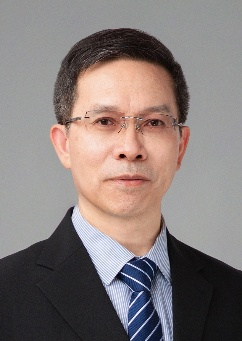大会报告人1:

Professor Zhong-Ping JIANG
New York University,IEEE Fellow
Biography
Zhong-Ping JIANG received the M.Sc. degree in statistics from the University of Paris XI, France, in 1989, and the Ph.D. degree in automatic control and mathematics from ParisTech-Mines (formerly called the Ecole des Mines de Paris), France, in 1993, under the direction of Prof. Laurent Praly.
Currently, he is a Professor of Electrical and Computer Engineering at the Tandon School of Engineering, New York University. His main research interests include stability theory, robust/adaptive/distributed nonlinear control, robust adaptive dynamic programming, reinforcement learning and their applications to information, mechanical and biological systems. In these fields, he has written six books and is the author/co-author of about 600 peer-reviewed journal and conference papers.
Prof. Jiang is a recipient of the prestigious Queen Elizabeth II Fellowship Award from the Australian Research Council, CAREER Award from the U.S. National Science Foundation, JSPS Invitation Fellowship from the Japan Society for the Promotion of Science, Distinguished Overseas Chinese Scholar Award from the NSF of China, and several best paper awards. He has served as Deputy Editor-in-Chief, Senior Editor and Associate Editor for numerous journals. Prof. Jiang is a Fellow of the IEEE, IFAC, CAA and AAIA, a foreign member of the Academia Europaea (Academy of Europe), and is among the Clarivate Analytics Highly Cited Researchers and Stanford’s Top 2% Most Highly Cited Scientists. In 2022, he received the Excellence in Research Award from the NYU Tandon School of Engineering.
Title: Small-Gain Theory for Stability and Control of Interconnected Systems
Abstract: The world is nonlinear and linked. Small-gain theory is one of the most important tools to tackle fundamentally challenging control problems for interconnected nonlinear systems. In this talk, I will first review our early work in nonlinear small-gain theorems and associated nonlinear control design. Then, I will present recent developments in network small-gain theorems for complex large-scale nonlinear systems, with applications to networked and event-triggered control under communications and computation constraints. Finally, I will discuss how small-gain methods can be integrated with reinforcement learning techniques to solve real-time decision-making problems, when the system model is completely unknown. Autonomous driving and human motor control will be used to illustrate our recent research in learning-based control, a new direction in control theory.
大会报告人2:

Professor Guoping Liu
Southern University of Science and Technology, China
Biaography
Professor Guo-ping Liu received the BEng degree in industrial automation and MEng degree in control engineering from the Central South University of Technology in China and the PhD degree in control systems from the University of Manchester in the UK. He was a professor with the Institute of Automation in the Chinese Academy of Sciences, University of South Wales, Harbin Institute of Technology, and Wuhan University. He is now a chair professor with the Southern University of Science and Technology. Prof Liu’s research interests include networked control systems, multi-objective optimal control and intelligent decision, nonlinear identification and intelligent control, and industrial advanced control applications. He was named a highly cited researcher by Thomson Reuters, Clarivate Analytics, and Elsevier, and was awarded the Alexander von Humboldt research fellowship. He received the second prize of Chinese National Science and Technology Awards twice. Prof. Liu was the general chair of the 2007 IEEE International Conference on Networking, Sensing and Control, 2011 International Conference on Intelligent Control and Information Processing, and 2012 UKACC International Conference on Control. He is a member of the Academy of Europe and a fellow of IEEE, IET and CAA.
Title: High-order Fully Actuated Predictive Control for Networked Systems
Abstract: The rapid development of network technology accelerates the development of networked systems, such as the Internet of things and industrial Internet systems. This talk mainly introduces the high-order fully actuated predictive control for networked systems. A generic high-order fully actuated model in the discrete-time domain is employed to describe the control problem of both networked linear and nonlinear systems with communication constraints. Based on this model, various high-order fully actuated predictive control schemes are discussed, which actively compensate for communication constraints and simultaneously achieve required stability and performance. Those schemes greatly simplify the design of networked control systems with communication constraints and significantly make them have the similar control performance to networked systems without communication constraints. The closed-loop high-order fully actuated predictive control systems are analysed and the criteria on their stability are derived. Various simulations and experiments successfully demonstrate the effectiveness of the high-order fully actuated predictive control schemes.
大会报告人 3:

Professor Michael V. Basin
Autonomous University of Nuevo Leon, Mexico
Ningbo University of Technology, China
Biography
Michael V. Basin (SM’07, M’95) received his Ph.D. degree in Physical and Mathematical Sciences with major in Automatic Control and System Analysis from the Moscow Aviation University (MAI) in 1992. He is currently Full Professor with the Autonomous University of Nuevo Leon, Mexico, and the Ningbo University of Technology, China. Starting from 1992, Dr. Basin published more than 400 research papers in international referred journals and conference proceedings. He is the author of the monograph “New Trends in Optimal Filtering and Control for Polynomial and Time-Delay Systems,” published by Springer. His works are cited more than 8000 times (h-index = 48). Dr. Basin has supervised 17 doctoral and 10 master's theses. He has served as the Editor-in-Chief and serves as the Co-Editor-in-Chief of Journal of The Franklin Institute, the Senior Editor of IEEE/ASME Transactions on Mechatronics and IEEE Transactions on Systems, Man and Cybernetics: Systems, an Associate Editor of Automatica, IET-Control Theory and Applications, International Journal of Systems Science, Neural Networks. Dr. Basin was awarded a title of Highly Cited Researcher by Thomson Reuters, the publisher of Science Citation Index, in 2009, and listed in “100 000 Leading Scientists in the World”; he is a regular member of the Mexican Academy of Sciences and a recipient of the Kimura Best Paper Award from Asian Control Association. Prof. Basin has been honored as a Fellow of Prominent Talent (Qian Ren) Program of Zhejiang Province, China. His research interests include optimal filtering and control problems, stochastic systems, time-delay systems, identification, sliding mode control and variable structure systems, applications to mechatronic and transportation systems.
Title: Predefined-Time Convergent Continuous Controllers: Design and Applications
Abstract: This talk presents predefined-time convergent continuous controller design for scalar and multidimensional systems with incompletely measured states and matched/unmatched disturbances. The theoretical design principles are outlined and applied to stabilization problems for full-scale 4D permanent-magnet synchronous motor (PMSM) and brushed direct current (DC) motor systems. Three cases have been considered: disturbance-free, in presence of matched/unmatched deterministic disturbances satisfying Lipschitz condition, and in presence of both matched/unmatched stochastic white noises and deterministic disturbances satisfying Lipschitz condition. A predefined-time convergent observer is designed to reconstruct unmeasurable system states and provide the controller feedback. Numerical simulations are conducted to validate the obtained theoretical results in each of the three considered cases. The simulation results demonstrate that the employed values of the predefined-time convergent control inputs are applicable in practice and verify the algorithm efficiency in each considered case. Finally, some ideas for designing predefined-time convergent continuous controllers based on the concept of fully actuated systems are discussed.
